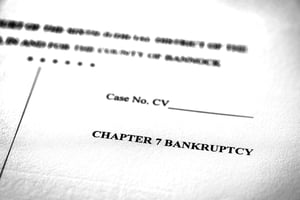Can I Keep My Bonuses and Tax Refunds in My Chapter 13 Bankruptcy Case in Saint Paul, Minnesota?
Chapter 13 bankruptcy can afford a great deal of financial relief for people who are struggling to pay their debts. In a chapter 13 bankruptcy case, the debtor (the name for a person who files for bankruptcy) agrees to pay as much as they can towards their debts in a three to five year repayment plan.
Typically, the debtor only pays a small fraction of their total debts in the repayment plan and, upon successfully completing the plan, they receive a discharge of their remaining debts (with some exceptions). Generally speaking, Minnesotans who earn more than the median gross income for the State of Minnesota are required to file a chapter 13 case, rather than a chapter 7 case. However, lower income Minnesotans who may otherwise qualify for a chapter 7 bankruptcy may choose to file a chapter 13 case for certain reasons. For example, an individual may have a lot of “nonexempt” property, meaning property that can be taken by the trustee to pay creditors in a chapter 7 bankruptcy case. In such a case, that individual may elect to file a chapter 13 bankruptcy in order to keep all their property, since the debtor is allowed to keep all of their property in a chapter 13 case.
The debtor must contribute all of their “disposable” income towards their monthly chapter 13 payments. Disposable income is the amount of money that is left over, each month, after the debtor pays their basic expenses, such as food, mortgage/rent, car payments, clothing, and etc. Basically, the debtor must make their “best effort” to pay their creditors as much as they can after paying all their other necessary expenses. Additionally, in order for the debtor’s chapter 13 repayment plan to be confirmed (approved) by the court, they must pay to their general unsecured creditors (i.e. unsecured loans, credit cards, medical bills, and etc.) at least as much as if they had hypothetically filed a chapter 7 case, and turned over their nonexempt property to the trustee to pay their debts (essentially the value of their nonexempt property). Also, in order to be confirmed by the court, the debtor’s chapter 13 plan must pay in-in full all “priority” debts, including past-due domestic support obligations (i.e. child support and alimony), and past-due tax debt, which would not be dischargeable in a chapter 7 case. Lastly, the plan must pay all past-due secured debts, such as delinquent car loans or mortgages, if the debtor desires to keep that property.
In order for the debtor’s plan to be confirmed, they must show that they have regular income from their job that is sufficient to meet all of the above requirements. In many cases, the debtor will also receive significant bonuses from their employer and substantial tax refunds. Before allowing the debtor’s plan to be confirmed by the chapter 13 trustee will often require that the plan provide that the debtor turns over, at least, a portion of this “additional” money. The trustee will often require that the debtor turn over their net bonuses, as they are received. In some cases, the trustee will allow the debtor to average their estimated annual bonuses over a 12 month period, in which case the bonuses are just considered additional monthly income. In these cases, the trustee will generally allow the debtor to keep their bonuses but, in exchange, the debtor will likely have to pay a higher monthly payment, unless they have enough allowable expenses to justify allowing them to keep the extra monthly income.
Debtors who receive a large tax refund will likely also have to turn over a portion of their tax refunds as an “additional” payment to their creditors. In Minnesota, the chapter 13 trustees generally allow debtors to keep $2,000 of their tax refund, if they file joint tax returns with their spouse, and $1,200, if they file an individual tax return. On top of that amount, debtors are also allowed to keep any portion of their Federal refund that comes from the Earned Income Tax Credit and any portion of their State refund that comes from the Minnesota Working Family Credit. The rest of their tax refund must ordinarily be turned over to the trustee. In practice, in certain circumstances, debtors may be permitted to keep their tax refunds and bonuses when they can demonstrate that the money is needed for necessary expenses. For example, a debtor may need their large bonus or tax refund for an unforeseen car repair or medical expense that arises during their bankruptcy case. It is notable that turning over tax refunds and employment bonuses do not reduce the overall amount that needs to be paid to creditors during the three to five year repayment plan or shorten the length of time the plan itself. Tax refunds and bonuses are deemed to be extra disposable income that needs to be paid in addition to the amount of money that gets paid to creditors from the debtor’s monthly payments. Once the court confirms the debtor’s three to five year plan, the debtor is committed to contributing ALL of their disposable income for the entire length of the plan, and the only way to complete the plan sooner is to pay all debts, in-full (except in rare circumstances).
Successfully completing a chapter 13 repayment plan is often very challenging, but the reward for successfully completing the plan and receiving a discharge makes the journey worthwhile!
CALL NOW FOR A FREE STRATEGY SESSION FROM A MN BANKRUPTCY LAWYER AT LIFEBACK LAW FIRM
To best ensure a successful filing and completion of a chapter 13 case, it is wise for a person considering filing for a chapter 13 bankruptcy to first consult with an experienced bankruptcy attorney. LifeBack Law Firm now has a new office location at 370 Selby Ave, Suite 224, Saint Paul MN 55102 in the historic Cathedral Hill neighborhood. Check us out online at Lifebacklaw.com to schedule an appointment with one of our experienced bankruptcy attorneys there, at one of other offices around the Twin Cities and greater Minnesota, or virtually via phone, FaceTime, or video chat!



![How USCIS Defines Good Moral Character [2023] How USCIS Defines Good Moral Character [2023]](https://www.immi-usa.com/wp-content/uploads/2021/02/Screen-Shot-2022-12-20-at-12.56.34-PM-300x115.png)



